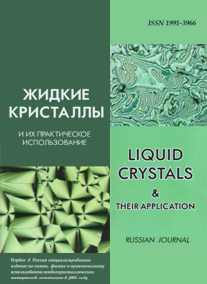|

|
Liquid Crystals and their Application
Russian Journal Zhidkie kristally i ikh prakticheskoe ispol'zovanie Жидкие кристаллы и их практическое использование |

|
|

|

|
|
|
Menu

|
|
|
|
|
Zhidk. krist. ikh prakt. ispol'z. = Liq. Cryst. and their Appl., 2015, 15 (2), 73—77. |

|
|
Surface Nanostructured Relief Influences on Spectral and Structural Properties of the Liquid Crystal Matrixe with Cerium and Praseodymium Nanoparticles
|
N. V. Kamanina1,2, Yu. A. Zubtsova1, S. V. Likhomanova1,3, A. A. Kukharchik1,2,
A. C. Lazar4, Ileana Rau4
|
Author affiliations
1Vavilov State Optical Institute,
5 Cadet Line V.O., Bld. 2, St. Petersburg, 199053, Russia
E-mail: nvkamanina@mail.ru
2St. Petersburg State Electrotechnical University «LETI»,
5 Prof. Popov St., St. Petersburg, 197376, Russia
3St. Petersburg National Research University of Information Technologies, Mechanics and Optics,
49 Kronverksky Ave., St. Petersburg, 197101, Russia
4Faculty of Applied Chemistry and Materials Science, University Polytehnica of Bucharest,
1 Polizu St., Bucharest, 011061, Romania
E-mail: ileana_brandusa@yahoo.com
|
|
Abstract
The paper considers the surface nanostructured relief influences on the spectral and structural properties of the liquid crystal (LC) matrixes doped with the cerium and praseodymium nanoparticles. The relief mentioned above has been made on the interface between glass substrate with ITO-coating and the LC mesophase. The specific of this relief is based on the applying of the contactless laser deposition technique and the relief modification is connected with usage of surface electromagnetic waves (SEW) or carbon nanotubes (CNTs) treated with SEW. The relief indicated permits to orient LC dipoles without direct polymer orienting layers and can be used as the conducting layer as well. The features mentioned above lead to decrease of the resistivity and the bias voltage as well as permit to increase the transparency of the LC element and reveal the IR-shift in the spectra.
Keywords: Liquid crystals, surface relief on the interface, sensibilization, cerium and praseodymium nanoparticles, carbon nanotubes, surface electromagnetic waves, IR spectral shift
|
|
|
|
|
|




